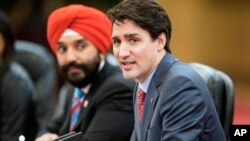Canada hopes a trade agreement with China will reflect "Canadian values" in the areas of labor rights, environmental protection and gender equality, Prime Minister Justin Trudeau said Monday at the start of a four-day visit to China.
Trudeau also said that he and Chinese Premier Li Keqiang had agreed to a joint statement on climate change and clean growth laying out a blueprint for close collaboration, including regular ministerial-level meetings.
Li said the two countries will continue to work on exploratory talks and feasibility studies for a trade agreement, and that their discussions had also touched on human rights and the rule of law.
"Both sides should view that, due to the different national circumstances, it is only natural that we don't see eye-to-eye on some issues. As long as we act on the principles of mutual respect, equality and mutual benefit, then we can seek mutual understanding and further promote this bilateral relationship," Li said.
It's not clear how close the countries are to a trade agreement, and Trudeau's proposal that it incorporate issues of governance, the environment and gender equality runs against China's inclination to keep such issues separate.
"We believe that done properly, a trade agreement will benefit both countries, creating jobs, strengthening the middle class and growing our economies," Trudeau said. "It's an opportunity that makes sense for Canadian businesses. Canada is and always has been a trading nation, but the landscape of trade is shifting and we need to adjust to it."
He said Canada was committed to "pursuing progressive trade that benefits everyone," both with China and other economic partners, describing that as "Trade that puts people first and reflects Canadian values, especially when it comes to labor, the environment and gender."
Trudeau and Li also presided over the signing of agreements on food imports, education and energy cooperation.
China has positioned itself as a leading advocate of free trade, particularly since President Donald Trump pulled the U.S. out of the Trans-Pacific Partnership, a pan-Pacific trade deal. Yet foreign businesses often complain that China closes many key areas to foreign investment, and Xi is known to favor a centralized economic model with special support for state-owned industries.
Canada has remained part of the Trans-Pacific Partnership. During recent talks in Danang, Vietnam, Trudeau lobbied for strong provisions for environmental protection, labor rights, and gender issues, and the name of the initiative was altered to be the Comprehensive and Progressive Agreement for Trans-Pacific Partnership.
China largely imports wood and agricultural products, ore, fuels and seafood from Canada, while Canada imports machinery, furniture and sporting goods and textiles from China. The trade imbalance has narrowed, but China still ran a surplus of about $17 billion with Canada during the first half of this year, according to the Canadian government.
Accompanied by four Cabinet ministers, Trudeau started the day with a visit to a Chinese social media giant where he talked up the advantages of travel to his homeland.
At Sina, owner of the popular Twitter-like Weibo microblogging service, Trudeau took part in a panel discussion that touched on Canadian tourism attractions, as well as the nation's beer and wine, according to Chinese and Canadian reports.
Next year marks the China-Canada year of tourism and Canada is hoping to double the number of Chinese tourist arrivals.
Ties between China and Canada have long been close, and under Trudeau, the two heads of government have agreed to meet annually in addition to holding a range of dialogues on various issues.
In remarks at the start of their meetings at the Great Hall of the People in central Beijing, Li commented on the closeness of the relationship.
"It's rare to have such a close, intimate relationship where we have mutual exchanges of visits along with such dialogues," Li told Trudeau in remarks at the start of their meeting. "China-Canada relations are indeed headed toward a golden stage."
Trudeau is to meet with President Xi Jinping on Tuesday.




